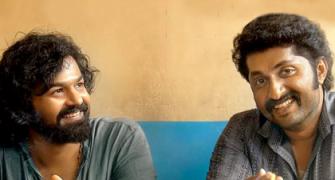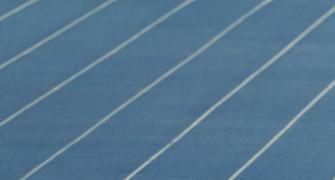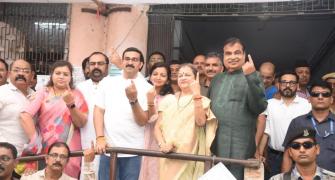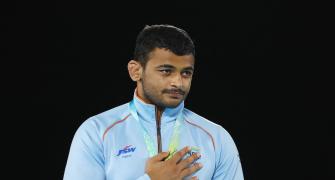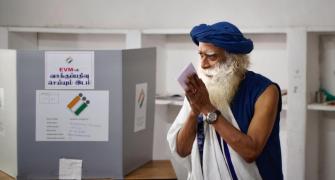Do not go by SMS polls and popularity ratings, Foreign Minister Pranab Mukherjee told the United Progressive Alliance's presidential candidate Pratibha Patil when she called on the Union Cabinet on Thursday. The people of India don't elect the President, it is the elected representatives who elect him, Mukherjee is reported to have told her.
The comment was obviously directed at President APJ Abdul Kalam who is clearly the people's choice to continue in Rashtrapati Bhavan. On rediff.com's poll, for instance, he enjoys almost 90 percent popularity rating.
The President's election is hitting the headlines because all the players in the grand game seen before cameras and not-seen-before the cameras believe that in the 2009 general election no single party will get a majority.
The fear of hung Parliament runs deep among political parties. They think the precarious balance of power will result in an interpretation of various Constitutional provisions to make or break the government.
In such a scenario the President's role to interpret and apply the Constitutional provisions becomes crucial; at least that's what the insecure politicians think.
It is interesting to note that the system devised by the Founding Fathers of the Constitution to elect the President of India was adopted without any brainstorming session in the Constituent Assembly.
And till today it remains largely unchanged, and complex.
This year, 543 members of the Lok Sabha and 233 members of the Rajya Sabha will directly participate in the Presidential election.
In addition, 4120 MLAs from 28 states and seven Union territories will also take part in the voting.
Under the Constitution and under the laws that govern Presidential and Vice-presidential elections, the President is elected by an electoral college consisting of elected members of both houses of Parliament and state assemblies. Not nominated members.
All of them participate in the election as members of the electoral college and not as members of the House (Lok Sabha, Rajya Sabha or the state assembly) they represent.
That's why all the talk and controversy about possible cross-voting is based on a technically incorrect premise.
Because, when a Lok Sabha members votes to elect the president he is doing so as an elected member and not because he is a member of a political party.
For example, even if a Bharatiya Janata Party legislator from Rajasthan decides to vote against Bhairon Singh Shekhawat (if he stands for election), it can't be termed as cross-voting in spite of his party's backing for Shekhawat.
This is so because according to law political parties do not elect the President nor do they have any role in his election. It's the privilege of individual members of the electoral college to elect the President.
Members of Parliament and state assemblies do not vote for the President as members of the House because under the law whatever function he or she performs as a member of the House or assembly is subject to the anti-defection law and directives from their parties.
As it happens in the United States, the President is elected by the electoral collage and not by the people directly.
Subhash Kashyap, who has written more than a dozen books and many monograms on the Indian Constitution and issues related to Indian Parliament, governance and political reforms, told rediff.com, "The difference between the US and the Indian system is that instead of having a separate election to elect an electoral college to elect the President, our founding fathers decided to use the (already) elected members of both the houses of Parliament and the state assemblies to constitute the electoral college to elect the President of India."
The election of the Indian President is by secret ballot.
In the 2007 election 4896 members who form the electoral college are expected to vote fearlessly, freely and without any pressure from any source. In electing the President, no directive or whip from political parties could be legitimate or valid.
A whip is issued only for the business of the House. The presidential election is not part of the business of the House.
Kashayap explains, "The election of President is not the business of the Houses. There is no question of voting on party lines, so all talk of cross-voting is phony because everybody is supposed to vote freely."
Till the anti-defection law came about in 1986, the Indian Constitution didn't mention political parties at all so their role in presidential election isn't substantial.
Kashyap explains that the President is elected by a system called 'proportional representation by single transferable vote'.
In case of the presidential election every voter (MLA and MP) has as many votes as there are candidates. Say, three candidates are in the race this time, then each member of the electoral college will have three votes. While voting they will be asked to give their first preference, second preference and third preference.
It is not necessary to vote for all the candidates. Nor is he bound to show other preferences after voting for one.
Each vote has a value attached to it, which is fixed on the basis of the population of the state according to the 1971 census.
The value of each MLA's vote is arrived at by dividing the population of the state by the number of seats in the assembly. The figure is then multiplied by 1000. This multiplication was done to make figures manageable.
In Sikkim the value of an MLA's vote is just 7, while in Uttar Pradesh the value is 208.
Nominated member of the Houses including the two Anglo-Indian members nominated to the Lok Sabha are not entitled to vote. Similarly, the 12 nominated members of the Rajya Sabha are not entitled to vote.
In case of members of Parliament, the value of their vote is determined by dividing the total value of votes of all the voters of the state assemblies by the total numbers of seats in the Lok Sabha and Rajya Sabha.
Kashyap says the purpose of all this "value business" was to arrive at a fine balance of votes between MLAs and MPs. The value of an MP's vote is around 708.
On the basis of the above calculations this time MLAs of the UPA and Left parties have 5,17,369 votes. The National Democratic Alliance's MLAs command 3,41,027 votes, while the regional parties and independents account for 2,37,662 votes.
All the parties know their "value", which is why the presidential election looks like a bargaining mela.
The Samajwadi Party has 59,845 votes, including the value of its MPs votes which is 38,232.
Mayawati's Bahujan Samaj Party has already gained in many ways because she has in her pocket a voting strength of 45,162.
Chandrababu Naidu's Telugu Desam Party has 14,036 votes, of which its MPs' votes are worth 7080.
The All India Anna Dravida Munnetra Kazhagam's Jayalalithaa has 19,280 votes in her kitty.
A huge chunk belongs to the left parties who have 1,10,480 votes. Their MPs have 54,516 votes while MLAs have 55,964 votes.
Karunanidhi is mediating in the politics behind the presidential election on the strength of his party's 29,752 votes.
The total value of the votes of all members of Parliament is 5,49,408 and that of the state assemblies is 5,49,474, the total value of the votes of 4896 members of the electoral college coming to 10,98,882.
It is widely believed that Pratibha Patil has enough votes to get elected because she has the support of the Congress, UPA allies like the DMK, BSP and the Left parties.
Still, there is hyper political maneuvering this time in finding the second and third candidate because the counting of votes is such that it gives a chance to candidates who have got second or third preference votes.
While the MLAs vote in their respective state assemblies, the counting is done in New Delhi. All the ballot boxes from the states are brought to the Parliament premises where they are opened and the counting of first preference is done.
The secretary general of the Lok Sabha or Rajya Sabha is nominated as returning officer to conduct the election. They are nominated by terms.
In 1987, Kashyap was returning officer when R Venkatraman was elected as President defeating Justice V R Krishna Iyer.
Kashyap says, "During the counting of votes the total number of first preference votes is counted first. It is divided by two and one is added to know which candidate has got the majority."
If any candidate gets a majority of total votes polled as first preference, then the counting of second preference votes is not done.
If no one gets a majority in the counting of first preference votes, then the candidate who has the lowest number of first preference votes gets eliminated from the race and the second preference votes are counted from his ballot papers (provided there are more than two candidates in the race). Thus, in the second round of counting the person who gets the maximum second preference votes becomes important.
Depending on who is in the fray, Kalam or Bhairon Singh Shekhawat, the contestant can bank upon the second round of votes if the UPA candidate fails to get a clear majority in the first preference votes.
Kashyap says, "The Indian system to elect the President is unnecessarily complicated. Strictly speaking, it is not even proportional representation. The voter in the presidential election says 'this is my first preference' and then he gives an alternative by giving his second preference. So, the winner may always not be the representative candidate. The system could have been simpler."
Kashyap says there is tremendous Constitutional illiteracy in India so the current hype over the election of President is doing good in spreading knowledge.
There have been changes in the process too. Earlier, any ten persons from the electoral college could propose a candidate.
Now, one requires fifty proposers and fifty seconders to contest along with Rs 15,000 as deposit.
One of the minor difficulties is in verifying the signature of the proposer and seconder.
Kashyap says, "How do you verify? There is hardly any time to verify. It is possible to verify in an MP's signature in New Delhi but if an MLA proposes it is difficult to verify the signature in such a short time."
Talking about the current political activity over issue of selecting a candidate for the Presidency, Kashyap says, "The highest office of the country is devalued by the current political development to select a candidate. It is bound to affect the prestige of the office of President. It has wrongly been made into a political party affair. Ideally, consensus should have been tried."
He says, "The developments took such turns that the Communist parties could blackmail the Congress into not allowing its choice of President. There was consensus within the UPA over Shivraj Patil but the Communists could force their way and Pratibha Patil became their candidate. Pratibha patil is a fine person but that doesn't justify the way she was selected."
Kashyap says political predictions are a dicey business and he can't say who is likely to become the President but he predicts, "This time voting may not be on party lines, and it should not be on party lines. The secret poll works both ways. The Congress as well as BJP members can be expected to vote against their party's nominee."

